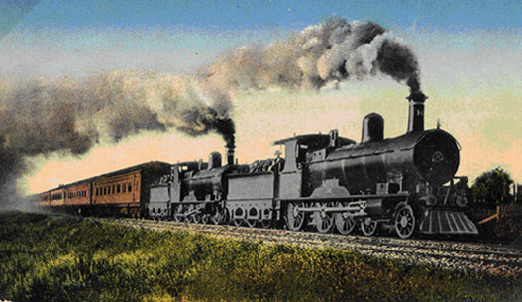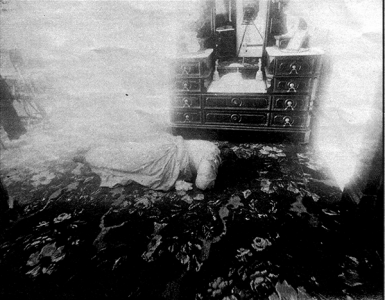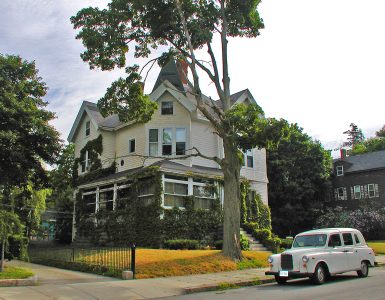by Kat Koorey
First published in December/January, 2005, Volume 2, Issue 6, The Hatchet: Journal of Lizzie Borden Studies.
The trunks were packed. All the clean laundry had been inventoried for each family member and all supplies accounted for. They were carrying everything a family of four needed for at least a month away from home. It was a massive undertaking.
Emma, at seventeen, still considered young and shy and inexperienced in the world, would hopefully be trustworthy and responsible, useful in looking after little Lizzie for her new stepmother on such a trip, as she was used to doing at home.
Trekking westward, after the Civil War, was considered almost routine now, especially as the railroads had prospered and expanded, adding Pullman cars and even refrigerated cars to their routes. The Pullman car’s appointments, for sleeping comfort, were already a bit outdated, needing upgrading of their materials after prolonged use by thousands over the past few years. Abby found these quarters claustrophobic, enclosed with those girls, but Andrew was confident she could forebear and keep quiet about it. She was not a complainer–at least not in public, where it mattered. The tracks were impressively smooth and at least the route, though a bit laborious and not straightforward by any means, passed through wide and interesting vistas. This alien territory was visually appealing, and the stops at the great western cities were full of wonders that a Yankee born and bred in the bone could only marvel at.
Traveling from Fall River, one could eventually go anywhere. The Old Colony Rail Road connected Fall River with other routes, where one could pick another train line or a ship, eventually leading to the wide world beyond. But Fall River, wanting to go out into the world, did not, in reciprocation, especially want that world coming into it.
Riding a train to Albany and tracking west from there, it was possible to actually follow a facsimile route of the slain President’s cortege of three years earlier. It had wound its way through an American countryside wracked by mourning, with the combined sorrows of the weight of a recent civil war and a death of a president–on to Chicago–at which point the funeral car, loaned by Pullman, turned toward Springfield and Lincoln’s home.
Whereas that journey would have been slow, ponderous and respectful, this trip of 1868 would be new, fast and exciting–in fact new passengers were aghast at the speed of this thing–some never having envisioned going as quickly as forty miles an hour in their life.
They would pass through the same cities who had paid homage to Lincoln in 1865–Albany to Buffalo, on to Cleveland and Columbus, through Indianapolis, Indiana, and north to the shore of the Great Lake Michigan at Chicago.
They had packed as much food as possible as would last hopefully two to three days, as breakfast alone for one person, at a whistle stop restaurant, could cost up to one dollar, he’d heard! Andrew Borden was not going to pay those rates if he could help it, and he had two good females, a new wife and a practically grown daughter, to care for his comfort and to see to it that this newly merged family ran efficiently and as smoothly as this train covered these tracks.
Andrew was interested in the opportunities of the west, especially now, after the war, and he had heard there was money to be made. His good friend, and brother-in-law, John Morse, had migrated to Illinois as a young man and had filled Andrew in on land prices and populations that were about to explode, especially in Chicago. In 1850, Chicago had nearly 30,000 residents, but nearing the end of the next decade the city was on its way to ten times that many!
Andrew had made a large quantity of land deals in Fall River in the year 1860–the same year his Lizzie was born. By 1868 he contracted one more transaction, in February, and cleared his desk of any more investment speculation in Fall River until he could see Chicago and the countryside of Illinois for himself, and assess the possibilities of investing out there. He didn’t know if he wanted to move his family there. He knew he would be happier at home if his new wife of three years was kept content, and if that meant staying on in Fall River where her close family ties were, then so be it. By now, Andrew felt he could make money just about anywhere, he had such confidence in his judgment and abilities.
However, it was a good time to travel, as the girls were of an age, his estate was growing satisfactorily, and he looked forward to some input from a man who was still his friend. Even though that man’s sister, Andrew’s first wife Sarah, and the mother of his two surviving daughters, had died and he himself had taken on a new wife, the men still wrote each other. Sarah should have been on this trip–even Emma had said so. It was bittersweet.
Morse was a trusted friend and advisor, clever, realistic and stoic, and Andrew knew Morse would keep their discussions private, nor would he ever try to undercut him. He was good to bounce ideas off of- better than any local Fall River man who might tattle his business around the city.
This was also a good time to introduce his wife to the Morse side of the family, and also Emma had been pressuring him to somehow bring her back into contact with her dearly loved mother’s kin who had migrated west at least 15 years previous. Her uncle John reminded her (and him, come to that) of her own dead mother Sarah, whom she sorely missed, though it had been five years now. The upset of a stepmother taking her mother’s place had put quite a strain upon his family home life. He had hoped Abby would have been accepted more readily than she had been. He needed a wife, and housekeeper and helpmeet, more than he needed an ungrateful daughter, and life must go on. But it could not be denied that Sarah had had a horror of the situation she had found herself in when her father, Anthony Morse, married his second wife Hannah Almy. Hannah had proceeded to produce a couple of children which were half-siblings to Sarah, and she, as the eldest, resented Hannah taking over responsibility for her surviving siblings. Why did elder daughters so rebel against a stepmother? But then the Morse family proceeded to pack up and move to western climes, away from Sarah, without Sarah’s feelings ever being considered. Andrew could see that Emma already had taken on her mother’s almost constant paranoia which produced discomfort in her own relationship with Abby. It was like a poison handed down to Emma from Sarah.
Andrew had thought about the unpleasant situation in his home, but did not know what to do about it. He also sometimes wondered if his Sarah had married him in reaction to acquiring a stepmother in Hannah at the beginning of 1845, for by Christmas that same year she had married him and left her father’s house. Well, it didn’t do to look at things too deeply. He would just continue on and hope for the best.
Emma would enjoy meeting up with her grandfather Anthony Morse, her uncles John and Fernando, Aunt Selecta and her half-uncle Alvarado and his sister Arabella, in Girard. There was also a new family member, Sarah, born there around 1856. She would be close to Emma’s age. Of course, little Lizzie had not known these Morse relatives, as they had variously moved half way across the country before she was born in 1860.
Little Lizzie, at eight years old, was about the right age, he figured, to benefit from getting to know her mother’s side of the family, plus since the Livermores had taken to Chicago so well and Daniel had a Pastorship there at the Universalist Church, Lizzie’s spiritual well-being could be confidently looked after in his Sunday school without any lapse.
The Livermores had been good friends of Sarah and Andrew the year that Daniel had the Pastorship of Fall River- the year of his own marriage to Sarah, in 1845. Besides, he had promised Sarah before she died that Lizzie’s spiritual welfare would be protected, that she would continue on into Sunday school, and that if it was at all possible the girls should be able to meet and spend time with her surviving Morse relatives. Emma was already a girl almost grown, at twelve years of age, when Sarah passed away, and her religious instruction was well in hand. It was baby Lizzie who concerned Sarah the most, and he could understand why- though he felt sometimes jealous that Sarah’s last plans and concerns were more for their child than for any loss he might sustain.
Ah well, a wife was bound to die at an inconvenient time in these days, but to realize there was the need to replace her so soon had come unexpectedly and it was not something he had planned on or wished for. Especially since Emma seemed to have inherited Sarah’s innate dislike of a stepmother and treated her as a usurper. Emma had heard plenty of that from Sarah’s complaints of her experiences and it soured her on Abby from the very beginning. Mrs. Livermore had understood this, from her close association with Sarah those many years ago. Maybe the good Pastor Daniel and Mary could advise him in this once they settled into their visit.
As the train blew steam like an over-exerted horse’s nostrils in the cold spring morning air, Andrew watched out the window with a feeling of anticipation. He’d be meeting up with family–a reunion of sorts. Anthony’s wife Hannah also would be introduced to Abby for the first time; he’d be getting some good advice from the Pastor and his somewhat modern wife on his own family matters; he’d be able to talk to John Morse about investment opportunities; it was a chance to possibly pursue new vistas and get his little family in better alignment while traveling to a new place–a sort of distraction from the unrest at home.
Yes, the benefits would eventually outweigh the costs of such an excursion. And who knows? Maybe when he returned to Fall River he would appreciate its potential even more–maybe buy a place of their own–maybe go ahead and get that 350 acres in Swanzy. He did like Swanzy. That was a place that felt like home.
Notes on Sources:
Rebello, Leonard. Lizzie Borden Past & Present. Fall River, MA: Al-Zach Press, 1999: 10. “When a young girl, she [Lizzie] accompanied her parents to Chicago and was there a member of the Sunday school class and punctual in attendance.”
Boston Herald, probably August, 1892. Quote attributed to Mrs. Charles J. Holmes, with other comments by unidentified friends of Lizzie.
Inquest Upon the Deaths of Andrew J. and Abby D. Borden, August 9- 11, 1892. Fall River, MA: Fall River Historical Society: 106. John Morse: “Years ago, out West at my place one time, he [Andrew] said he had a will; several years ago he told me he had destroyed it.”
“A Gentle Girl.” Boston Daily Globe, June 18, 1893: 4. “The stepmother of the woman of whom Lizzie has no recollection as mother, but whose affectionate memory is cherished by the elder sister, was a parishioner of the husband of Mrs. Livermore. The father of Lizzie’s mother was also a parishioner, and the acquaintance which occurred between the Livermores and the Bordens ripened into friendly regard. . . . Emma had often heard from her own mother’s lips the story of her life in the house of a stepmother. For the father of Emma’s mother had married twice, and her girlhood was passed under the not too kindly rule, perhaps, of the second wife. I know nothing of this, however. I only know that Emma’s mother had a horror of stepmothers, and that horror was effectually impressed on her elder daughter.”
“A Talk with Lizzie Borden.” Woman’s Journal, 24 May 1893: 162-3. “I [Mrs. Livermore] have corresponded with her [Lizzie] all through these months of waiting for the trial, but this was my first sight of her since early youth.”
James, Edward T. ed. Notable American Women 1607- 1950: A Biographical Dictionary, Vol. 2. Cambridge, MA: Belknap Press, 1971: 410-13. Sarah and Mary were 3 years apart in age. 1845 is the year when Mary and Daniel Livermore lived in Fall River and he had his pastorate there. They married in May 1845 and Sarah and Andrew married in December 1845. Mary’s daughter Henrietta Whitt Livermore was born in 1851 in Weymouth Massachusetts, and Sarah’s daughter, Emma Lenora Borden was born in Fall River in 1851. Sarah Morse Borden died in March of 1863, and at that time, March, 1863, for the first time, Mary A. Livermore was visiting Union army hospitals, bringing relief and supplies. It was the beginning of her total dedication to the soldier’s welfare, comfort and security, and was the most significant year in Mary’s life- this life-altering experience at wartime.
“The Elusive John Morse.” The Hatchet: Journal of Lizzie Borden Studies. June/July, 2004, Vol. 1, #3: 12-21. Morse family relationships and residency in Girard, Ill.
Richardson, Albert D. “Through To The Pacific.” A series of letters published in the New York Tribune, May-June, 1869. Item heading “From New York To Chicago.” A report of his train journey cross-country. http://www.cprr.org/Museum/Through_to_the_Pacific/Through_to_the_Pacific.html
“Abraham Lincoln’s Funeral Train.” Map route. http://members.aol.com/RVSNorton1/Lincoln51.html






